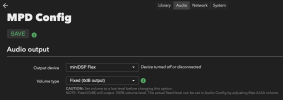Barrelhouse Solly
Senior Member
- Joined
- Aug 13, 2020
- Messages
- 375
- Likes
- 359
I've been fooling around with streaming music for over 10 years. It started when we got a DVD player with DLNA support. Then I got one of those, now defunct, Samsung music players that was essentially a phone without the phone. I discovered BubbleUPNP and other DLNA clients. The next step was a Raspberry Pi with a DAC HAT and Moode Audio. Because Moode and Volumio are very sluggish on my phone and tablet l've been experimenting with other solutions. For a couple of years I've been using a straight MPD setup using M.A.L.P as an Android client. A couple of weeks ago I tried Picoreplayer. I have it running on my bedside table on a Pi Zero 2 W playing through a Riva speaker. It works great. This led me to what I think is my favorite multi-room streaming setup. I found out that there is a version of Logitech Media Server that runs on QNAP. I have a low end NAS and it took a lot of back and forth on the LMS forum to get it running. It was an OS file permission thing that was an easy fix once I found out what it was. The interesting thing about the LMS setup is that it's client-server with a twist. There's a central server and player clients running on separate devices. You don't have to run it from each device. With a controller app, I use Squeezer, an open source Android app, you can control each player from one location. I have the clients on each device pointed to the LMS installation on the NAS and I use Squeezer to control which player I want to use. I just installed Squeezelite on a Pi running Raspbian and was delighted to find that LMS and Squeezer discovered it automagically. You don't need Picoreplayer if you don't mind missing a few features.
There are some cons. Moode is my favorite from the tweaking side. Beside Camilladsp, it has a host of other cool audio tweaks as well as the ability to connect with high bit rate streaming services. You can run it in LMS client mode but you need to control it from LMS or a controller app rather than its web interface. For casual listening I don't mind. MPD has some advantages but it involves a bunch of command line configuration stuff that exposes the unwary to the NIX way of life where things work well but seem to be Scotch taped together. I'm a retired programmer so I don't mind, but others might. The LMS approach is more of an appliance thing. You install the database/server centrally. You install clients everywhere you want them. You get the one ring app that rules them all. It doesn't offer the audio fine tuning you can get with Moode or Roon, but for day to day use you have everything you need on your phone.
One more thing, for a straight Raspbian solution, if you use something other than the standard Raspberry Pi audio, either a HAT or USB to a DAC, you do have to do some configuration with the Pi command line. You'll need to edit the config.txt file adding a dtoverlay for your HAT and for both, disabling the built in audio output. If you're unlucky you'll also have to configure your default ALSA device.
There are some cons. Moode is my favorite from the tweaking side. Beside Camilladsp, it has a host of other cool audio tweaks as well as the ability to connect with high bit rate streaming services. You can run it in LMS client mode but you need to control it from LMS or a controller app rather than its web interface. For casual listening I don't mind. MPD has some advantages but it involves a bunch of command line configuration stuff that exposes the unwary to the NIX way of life where things work well but seem to be Scotch taped together. I'm a retired programmer so I don't mind, but others might. The LMS approach is more of an appliance thing. You install the database/server centrally. You install clients everywhere you want them. You get the one ring app that rules them all. It doesn't offer the audio fine tuning you can get with Moode or Roon, but for day to day use you have everything you need on your phone.
One more thing, for a straight Raspbian solution, if you use something other than the standard Raspberry Pi audio, either a HAT or USB to a DAC, you do have to do some configuration with the Pi command line. You'll need to edit the config.txt file adding a dtoverlay for your HAT and for both, disabling the built in audio output. If you're unlucky you'll also have to configure your default ALSA device.
Last edited:

